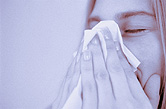- Double Mastectomy May Offer No Survival Benefit to Women With Breast Cancer
- Toxic Lead Found in Cinnamon Product, FDA Says
- Certain Abbott Blood Sugar Monitors May Give Incorrect Readings
- Athletes Can Expect High Ozone, Pollen Counts for Paris Olympics
- Fake Oxycontin Pills Widespread and Potentially Deadly: Report
- Shingles Vaccine Could Lower Dementia Risk
- Your Odds for Accidental Gun Death Rise Greatly in Certain States
- Kids From Poorer Families Less Likely to Survive Cancer
- Tough Workouts Won’t Trigger Cardiac Arrest in Folks With Long QT Syndrome
- At-Home Colon Cancer Test Can Save Lives
Poorer Childhoods, More Colds as Adults?


WEDNESDAY, Nov. 6Adults who grew up in poorer families might be more likely to catch colds than those who were raised in wealthier households, researchers report.
The new study included about 150 healthy people, aged 18 to 55, who were asked if their parents owned their family’s home when the participants were aged 18 or younger. The volunteers were then exposed to a cold virus, and followed to see if they developed a cold.
People who grew up in poorer families — indicated by fewer years that their parents were homeowners — were more likely to develop a cold, the investigators found. Specifically, the volunteers’ chances of catching a cold increased by 9 percent for each year their parents were not homeowners while the participants were growing up.
Further study showed that participants who grew up in poorer families had shorter telomeres than their wealthier peers. Telomeres are protective cap-like protein complexes at the end of chromosomes. They function in much the same way that the plastic tips at the ends of a shoelace protect the lace from unraveling.
Having shorter telomeres has been linked to the early onset of illnesses, such as cardiovascular disease and cancer; death in older adults; and increased susceptibility to infectious diseases in young to middle-aged adults.
“[The findings provide] valuable insight into how our childhood environments can influence our adult health,” study author Sheldon Cohen, a professor of psychology at Carnegie Mellon University, said in a university news release.
The study was published in the November issue of the journal Brain, Behavior and Immunity.
“We have found initial evidence for a biological explanation of the importance of childhood experiences on adult health,” Cohen said. “The association we found in young and midlife adults suggests why those raised by parents of relatively low [social and economic] status may be at increased risk for disease throughout adulthood.”
Although the study found an association between economic status in childhood and susceptibility to catching a cold in adulthood, it did not prove a cause-and-effect relationship.
More information
The University of Utah has more about telomeres.
Source: HealthDay
Copyright © 2024 HealthDay. All rights reserved.










